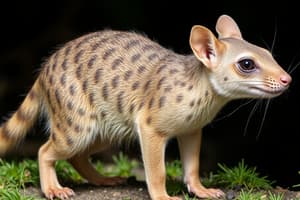Podcast
Questions and Answers
Which of these options correctly represent subclasses of the class Mammalia?
Which of these options correctly represent subclasses of the class Mammalia?
- Theria (correct)
- Eutheria
- Metatheria
- Protheria (correct)
Which infraclasses fall under the subclass Theria?
Which infraclasses fall under the subclass Theria?
- Monotremata
- Metatheria (correct)
- Eutheria (correct)
- Marsupionta
What subclass do monotremes and marsupials belong to?
What subclass do monotremes and marsupials belong to?
Marsupionta
Which subclass does the order Monotremata belong to?
Which subclass does the order Monotremata belong to?
What are the two extant suborders of the Order Monotremata?
What are the two extant suborders of the Order Monotremata?
Family and genus of the platypus?
Family and genus of the platypus?
Family and genus of the echidna?
Family and genus of the echidna?
What subclass and infraclass do marsupials fall under?
What subclass and infraclass do marsupials fall under?
The anatomical term for the pouch is ____.
The anatomical term for the pouch is ____.
List the seven orders below Infraclass Metatheria.
List the seven orders below Infraclass Metatheria.
What is the name of the superorder that includes all Metatheria orders except Didelphimorphs?
What is the name of the superorder that includes all Metatheria orders except Didelphimorphs?
Infraclass: Eutheria is also known as ____.
Infraclass: Eutheria is also known as ____.
Which type of mammals are described as the most successful and widely distributed infraclass?
Which type of mammals are described as the most successful and widely distributed infraclass?
Eutherians give live birth.
Eutherians give live birth.
Eutherians generally have higher ____ and more complex ____.
Eutherians generally have higher ____ and more complex ____.
What are the four superorders organized from the 20 orders of eutherians?
What are the four superorders organized from the 20 orders of eutherians?
Which orders were previously grouped under Insectivora?
Which orders were previously grouped under Insectivora?
List the 7 extant orders of the superorder Afrotheria.
List the 7 extant orders of the superorder Afrotheria.
List the 2 extant orders of the superorder Xenartha.
List the 2 extant orders of the superorder Xenartha.
List the 5 extant orders of the superorder Euarchontoglires.
List the 5 extant orders of the superorder Euarchontoglires.
List the 5 extant orders of the superorder Laurasiatheria.
List the 5 extant orders of the superorder Laurasiatheria.
What are the two previously separated orders that now constitute Cetatriodactyla?
What are the two previously separated orders that now constitute Cetatriodactyla?
Some classification schemes place Cetatriodactyla and Perissodactyla into the clade _____.
Some classification schemes place Cetatriodactyla and Perissodactyla into the clade _____.
Some schemes place the orders Pholidota and Carnivora into the clade _____.
Some schemes place the orders Pholidota and Carnivora into the clade _____.
Mammals evolved from a group of reptiles called _____.
Mammals evolved from a group of reptiles called _____.
Synapsid reptiles were distinguished by only having one pair of ____ ____.
Synapsid reptiles were distinguished by only having one pair of ____ ____.
What group of synapsids evolved from the Carboniferous period?
What group of synapsids evolved from the Carboniferous period?
What do we call the group around 275 million years ago that includes several synapsid advancements?
What do we call the group around 275 million years ago that includes several synapsid advancements?
Flashcards are hidden until you start studying
Study Notes
Phylogeny and Diversification of Mammals
- Mammalia is divided into two subclasses: Protheria (monotremes) and Theria (all other mammals).
- Theria is further classified into two infraclasses: Metatheria (marsupials) and Eutheria (placentals).
- Marsupionta suggests a sister group relationship between marsupials and monotremes, separating them from eutherians.
- Prototheria encompasses the order Monotremata, which includes monotremes like the platypus and echidna.
- The Order Monotremata has two extant suborders: Platypoda (platypus) and Tachyglossa (echidna).
- The family of platypus includes Ornithorhynchidae and the genus Ornithorhynchus, which has species like Ornithorhynchus anatinus.
- Echidnas belong to the family Tachyglossidae, including genera Tachyglossus and Zaglossus.
- Marsupials fall under subclass Theria and infraclass Metatheria.
- The anatomical term for the pouch in marsupials is marsupium.
- Infraclass Metatheria includes seven orders: Didelphimorphia, Paucituberculata, Microbiotheria, Dasyuromorphia, Peramelemorphia, Notoryctemorphia, and Diprotodontia.
- Superorder Australidelphia comprises all Metatheria orders except Didelphimorphia, originally from South America and underwent adaptive radiation in Australia.
- Eutheria, also known as Placentalia, represents the subclass and infraclass of placental mammals, which are viviparous.
- Eutherians are successful, found on every continent, differing from monotremes by giving live birth.
- Key differences between Eutherians and Metatheria include presence of placenta, higher metabolism, greater intelligence, and more complex social behavior.
- Molecular phylogenetics divides Eutherians into four superorders, each originating from distinct regions: Afrotheria (Africa), Xenartha (South America), Euarchontoglires (Northern continents), Laurasiatheria (Northern continents).
- The order Insectivora previously encompassed both Afrosoricida and Eulipotyphla.
- Superorder Afrotheria contains seven extant orders: Tubulidentata (aardvark), Afrosoricida (tenrecs), Eulipotyphla (shrews), Macroscelidea (elephant shrews), Hyracoidea (hyraxes), Proboscidea (elephants), Sirenia (manatees).
- Superorder Xenartha includes two extant orders: Cingulata (armadillos) and Pilosa (sloths).
- Superorder Euarchontoglires contains five extant orders: Rodentia (rodents), Lagomorpha (rabbits), Dermoptera (colugos), Scandentia (tree shrews), and Primates (apes).
- Superorder Laurasiatheria consists of five extant orders: Chiroptera (bats), Pholidota (pangolins), Carnivora (cats and dogs), Cetatriodactyla (whales and cows), Perissodactyla (horses).
- Cetatriodactyla is a new order formed from the merger of two previously separate orders: Artiodactyla (even-toed ungulates) and Cetacea (whales and dolphins).
- Some classification schemes combine Cetatriodactyla and Perissodactyla into the clade Euungulata.
- Orders Pholidota and Carnivora may be grouped in the clade Ferae.
- Mammals evolved from a group of reptiles known as Synapsids.
- Synapsid characteristics include one pair of temporal fossae on the skull, allowing muscle attachment.
- Pelycosaurs were one group of synapsids that evolved during the Carboniferous period.
- Therapsids are another synapsid group that appeared around 275 million years ago in the early Permian.
Studying That Suits You
Use AI to generate personalized quizzes and flashcards to suit your learning preferences.




